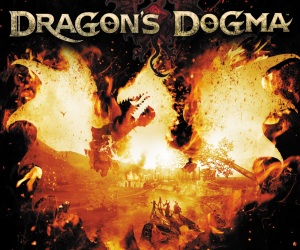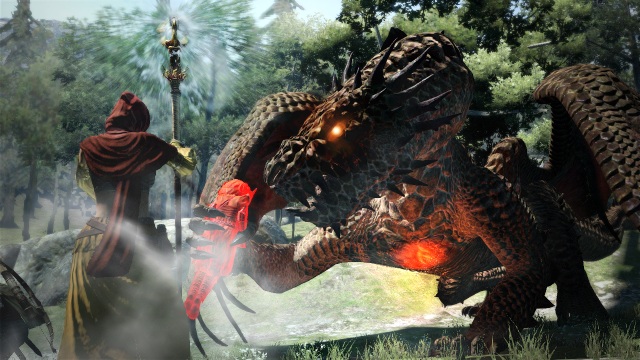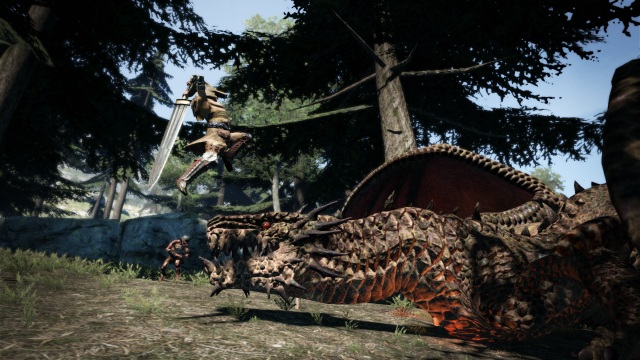Dragon’s Dogma Preview
 What do you get if you cross parts of Skyrim and Dark Souls with elements from Devil May Cry, then throw in numerous unique ideas? Well, you near as dammit get Capcom’s latest RPG offering, Dragon’s Dogma. You see, despite medieval action RPGs being most certainly en-vogue at the moment (The Witcher 2, Kingdoms of Amalur: Reckoning), Dragon’s Dogma manages to come across as something wholly unique, in a crowded genre.
What do you get if you cross parts of Skyrim and Dark Souls with elements from Devil May Cry, then throw in numerous unique ideas? Well, you near as dammit get Capcom’s latest RPG offering, Dragon’s Dogma. You see, despite medieval action RPGs being most certainly en-vogue at the moment (The Witcher 2, Kingdoms of Amalur: Reckoning), Dragon’s Dogma manages to come across as something wholly unique, in a crowded genre.
Dragon’s Dogma isn’t ashamed of its influences, from the moment you start the game it wears them proudly, but the depth to the combat alone makes it so different to all its contemporaries; it demands attention. Imagine an RPG where you face off against huge, monstrous creations that want to end your life, often the combat suffers drastically in these titles, but here you have fluent combat that allows you to get in close – if you wish – and actually scale the beasts, attacking them whilst hanging on for dear life in a manner not too far from Shadow of the Colossus. It’s exciting and scary at the same time, yet it feels brilliant and new.
Of course, like most RPGs, that play style may not be the one you go with. The choices of warrior, mage or archer are ever present in the genre, so after you’ve created your character using the ridiculously in-depth creation tools, you’ll start off being attacked by a huge dragon who speaks to you, and you alone, before ripping your heart out and eating it. Cursed, you awake to rumours you have no feelings any more, and set out into the world to tackle all manner of mystical beasts and other assorted enemies, with a view to chasing down the dragon who tore your heart out, and slaying it.

Just before you leave your home town though, you’ll encounter your first “Pawn”. These NPCs are one of the unique features in Dragon’s Dogma, you’ll get to design them to match your needs and the first one will accompany you for the rest of the game. But you can have more than one in your party, and they will help you on your quest, often offering words of encouragement or just plain common sense, they’ll tell you if you are going in the wrong direction, for example. You can create your own mini-army with Pawns, setting your party up for battle with different classes. They are basically your minions and you can tell them to attack, defend, go, stay, whatever you fancy really.
If you can’t afford a Pawn you really want, you can favourite them for later, but you can also trade pawns via Facebook integration if you wish, promoting, renting and borrowing other player’s pawns. This raises an interesting question as to why Capcom didn’t just go all the way and include some form of multiplayer, creating an almost MMO-like RPG in the process, but perhaps the console world still isn’t quite ready for that just yet. As it stands, the way it has all been handled in-game is excellent, and a really interesting idea, as while your pawns are out “on loan” they gain experience from fighting with others. Yet more social interaction is included with the ability to capture screenshots at any point and share to Facebook or Twitter.
At times, Dragon’s Dogma looks exceptional, but as with a lot of huge-world games, sometimes it can also look quite bland, with character’s faces looking a little odd. Characters are voiced too, despite a lot of dialogue on display, which is very impressive. If you are taking on the generic enemies that populate the world, you may not be blown away, but when you get to take on a three-headed snake-type creature or have to climb a troll – as you do early on in the game – the visuals will most certainly wow you.

The combat is a meaty part of the game though and is deepened through the levelling system. Of course, different classes play differently, using pawns effectively makes tactics rather important too, but at this stage it appears as if the game is more RPG than action game, somehow achieving the clever feat of throwing everything into a pot and still having a tasty potion at the end of it. Whereas in a lot of RPGs you might feel punished if you travel too far down a skill-tree in one direction (tanking your character, for example), this is completely avoided in Dragon’s Dogma due mostly to the pawn system.
That isn’t to say that Dragon’s Dogma is easy, far from it. There are areas where you will be punished for exploring early, you can fight valiantly but ultimately the sheer number and variety of foes attacking you will mean you’ll die, restart and be forced to think about taking an alternate path. Some enemies do appear to be never ending, with some sleight of hand happening when you finally clear an area, only to find one more enemy, who will summon more mobs to force you into submission. Again though, even these tricky areas can be tackled with some clever pawn tactics and use of the fluid, exciting combat systems.
With Dragon’s Dogma, Capcom appear to understand that people like to play things their own way, creating a massive open-world if you want it, or a story you’ll enjoy if you just want to go straight through the main quest without bothering with the side missions. There’s challenge if you want it, but you can avoid if you prefer to just enjoy the narrative. Even menus are customizable, allowing the player to choose how much they want on the screen at any time, it appears as if almost every potential player has been catered for.
With casual accessibility via the Pawn assistance and Facebook integration, yet the ultra-hardcore RPG facets we’ve all come to love being present too, Dragon’s Dogma is shaping up to be a game that fans of multiple genres should be keeping their beady eyes on.
Dragon’s Dogma is set for release for Xbox 360 and PlayStation 3 on May 25th in Europe, May 22nd in North America, and May 24th in Japan.





